
Whole-life carbon emissions: it’s not a phrase which would have been front of mind for those working in the property and construction sectors 20 years ago. However, now, with pressure mounting on all areas of business and society to step up and do their bit for the planet, developments are increasingly being assessed on the impacts they make on the world around them.
At Prologis, we’ve been working hard over the past 12 years to make our buildings as sustainable as they possibly can be, in large part due to our partnership with sustainability certification company, The Planet Mark and climate change charity, Cool Earth. Now, to coincide with World Environment Day, we’re rolling out this initiative across our European business and for the next 10 years, we will reduce and mitigate embodied carbon emissions in all of our new buildings in Europe.
Building on the progress we’ve made over the past 12 years, our extended partnership with Cool Earth will ensure that, for each new building across Europe, an area of rainforest 31 times the size of the unit’s footprint will be protected.
Matthew Owen, director of climate change charity, Cool Earth said: “Prologis has made, and continues to make, a powerful contribution to sustainable development through measuring and reducing the whole-life carbon emissions of its buildings. No other developer has gone this far.
“This is the Decade of Action, where every institution and every individual must contribute to society, tackling climate change and reversing biodiversity loss. To have a chance of limiting global warming to 1.5C, we need to reduce carbon emissions by 50 percent by 2030. This year must usher in a decade of ambitious action to deliver these global goals by 2030.”
Why the rainforest?
Even though it’s thousands of miles away from Europe, protecting the rainforest is essential in tackling climate change, as well as bringing wider benefits for society, cultures and biodiversity. Cool Earth’s work is centred around empowering local communities to help keep rainforest standing. As the planet’s global safety net, protecting the rainforest is the smartest, most positive climate action there is.
Rainforest trees lock in a quarter of the world’s carbon emissions and generate moisture, which travels around the world, and accounts for a fifth of the planet’s fresh water. Rainforests also protect over six million species of plants and animals (with many still undiscovered), forming an ecosystem which is essential to our survival.
What is ‘embodied carbon’?
Put shortly, embodied carbon relates to the carbon emissions produced during the construction maintenance and end of life dismantling of buildings. Whilst many professionals in the property industry are focused on the need to improve the operational sustainability of new buildings, the impact of embodied carbon is less widely understood and often ignored.
This problem is being addressed by certification programmes such as The Planet Mark, which have designed a robust methodology that developers can use to measure, reduce and mitigate a building’s carbon emissions. Embodied carbon can be reduced, but it’s impossible to eliminate it altogether, so developers should be thinking about countering these specific emissions by actively protecting the environment and supporting the development of sustainable communities.
Decade of Action
Our continued partnership is designed to support the UN’s Decade of Action, which empowers every individual and every institution to contribute to society, tackle climate change and reverse biodiversity loss.
To meet the ambitious goals of limiting global warming to 1.5C by 2030, we need to drastically cut carbon emissions and everyone has a part to play: my hope is that the rest of our industry, across Europe, will start looking at embodied carbon and consider supporting organisations like Cool Earth in their efforts to reduce global carbon emissions.
Building on progress
Since setting up the partnership with The Planet Mark and Cool Earth in 2008, we’ve made great strides in ensuring our development is as sustainable as it possibly can be.
Steve Malkin, CEO of Planet First and founder of The Planet Mark said: “Prologis’ commitment to sustainability demonstrates true leadership in its field and is helping to raise standards across the industry.
“We very much hope that others will follow Prologis’ example so that in the next 10 years, we can make this world, our home and our civilisation, happier, safer and more sustainable.”
Here’s what we’re building on for the next 10 years:

Find out more about more about our approach to sustainable buildings, communities and travel here.

